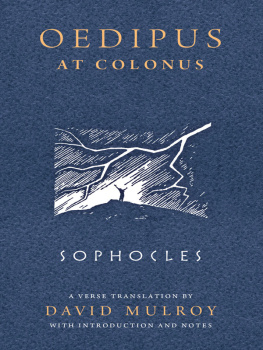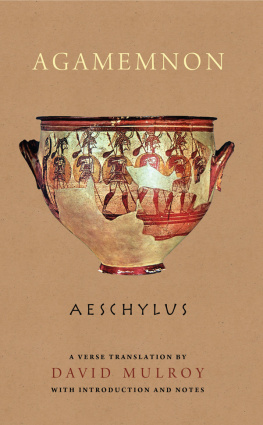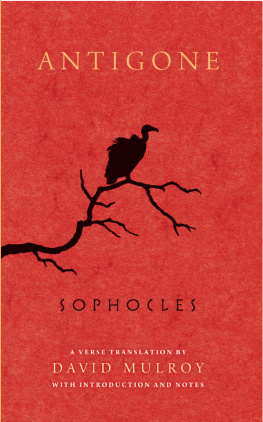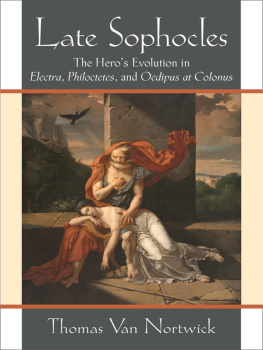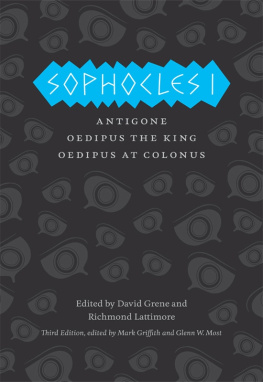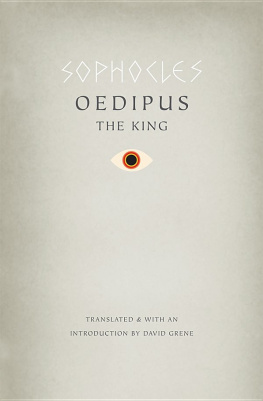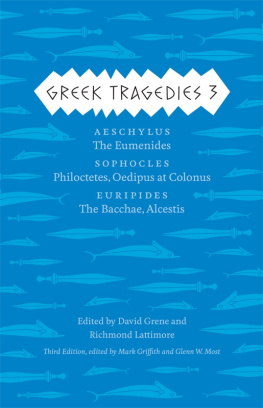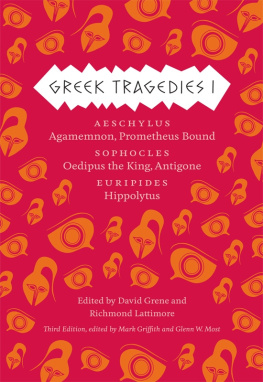Publication of this volume has been made possible in part
through the generous support and enduring vision of
Warren G. Moon.
Oedipus at Colonus
A verse translation by
David Mulroy,
with introduction and notes
The University of Wisconsin Press
The University of Wisconsin Press
1930 Monroe Street, 3rd Floor
Madison, Wisconsin 53711-2059
uwpress.wisc.edu
3 Henrietta Street, Covent Garden
London WC2E 8LU, United Kingdom
eurospanbookstore.com
Copyright 2014
The Board of Regents of the University of Wisconsin System
All rights reserved. Except in the case of brief quotations embedded in critical articles and reviews, no part of this publication may be reproduced, stored in a retrieval system, transmitted in any format or by any meansdigital, electronic, mechanical, photocopying, recording, or otherwiseor conveyed via the Internet or a website without written permission of the University of Wisconsin Press. Rights inquiries should be directed to .
Printed in the United States of America
Library of Congress Cataloging-in-Publication Data
Sophocles, author.
[Oedipus at Colonus. English]
Oedipus at Colonus / Sophocles; a verse translation by David Mulroy, with introduction and notes.
pages cm(Wisconsin studies in classics)
Includes bibliographical references.
ISBN 978-0-299-30254-2 (pbk.: alk. paper)
ISBN 978-0-299-30253-5 (e-book)
1. Oedipus (Greek mythology)Drama.
I. Mulroy, David D., 1943translator.
II. Title. III. Series: Wisconsin studies in classics.
PA4414.O5M85 2014
882.01dc23
2014009155
For
Roy Swanson
Contents
Preface
Oedipus at Colonus is one of Sophocles seven extant tragedies. He probably composed it shortly before his death in 406 or 405 BCE at the age of eighty-nine. It was first produced posthumously in 401 BCE and may be viewed as the sequel to Sophocles masterpiece, Oedipus Rex, which was probably written in the 420s.
Since Oedipus at Colonus is rarely the first Sophoclean tragedy that a reader tackles, I will forego summarizing Sophocles life and times and the general characteristics of the ancient Greek theater. I have written on those topics in my other two translations of Sophoclean works, Oedipus Rex and Antigone.
Many excellent translations of Sophocles plays, including Oedipus at Colonus, have been published in recent years. My translations are distinguished by the lengths I go to in order to recapture something of the rhythmic and musical character of the original Greek productions. Specifically, I have translated the spoken parts of the original into regular iambic pentameters, whereas the lyrical passages are translated into short rhymed stanzas. The original Greek also contains some anapests and trochees, which I have imitated in English. In addition to telling good stories, Greek tragedies were full of auditory pleasures. I consider my translations successful to the extent that the same can be said of them. They are meant to be read aloud.
If I were assigning my Oedipus at Colonus in a high school or college course, I doubt that I would require my own introduction. Equipped with footnotes where meanings are obscure, the play is accessible on its own. For students with little previous knowledge of Greek literature, however, I would highly recommend the first part of that introduction, The Story of Oedipus at Colonus, a summary of the play with excerpts from the dialogue. Its quick overview of the story will prepare them to read the whole play without getting lost in the details, and the poetic excerpts will give them some appreciation of the plays verbal pyrotechnics.
For some time I have been fascinated by the question of whether or not Sophocles depicts Oedipus as morally responsible for his mistakes. In my opinion, the text accommodates both interpretations. In my translation of Oedipus Rex I note my surprise that so many critics insist that Oedipus is unambiguously innocent. In the second part of my introduction, Oedipus as Tragic Hero, I return to that issue and lay out a case against him in somewhat greater detailincluding some original iambic pentameters.
In the next two sections, I investigate a pair of related questions that caught my interest as I worked on my translation. The first was whether Sophocles himself invented the story of Oedipus arrival, death, and burial in Colonus. The arguments pro and con are complicated and (I think) ultimately indecisive. On balance, I argue that the essential action of the play is probably Sophocles own inventionand a highly topical one. Shortly before he wrote the play, an assembly met in the temple of Poseidon at Colonus and temporarily dissolved Athenian democracy. If the title did not reflect a well-established tradition, it resonated with controversial and contemporary political associations: imagine Oedipus at Tahrir Square.
Suggested by that conclusion, the next part of my introduction attempts to depict the political backdrop of Oedipus at Colonus as well as that of the nearly contemporaneous Philoctetes. The plays were written during a period of desperate political tumult in Athens, which surely weighed heavily on Sophocles mind. There is, of course, no one-to-one correspondence between Sophocles characters and real-life politicians. On the other hand, the general points that are made in his plays often had obvious application to real life at the time. In the case of Philoctetes and Oedipus at Colonus, the piteous plight of exiles and their potential value to their native cities was a theme of unmistakable relevance to late fifth-century Athenians.
The introduction ends with some remarks on the religious implications of the play and a thought about Sophocles family life.
In doing my translation, I relied principally on the Lloyd-Jones text in the Loeb Library together with Jebbs text and commentary.
Notes
The date of Sophocles birth is not known. According to the anonymous biography transmitted with the texts of his plays, he was said to have been born in the archon year 495/494 BCE. I use 495 in calculating his age at various junctures. The Greek text of Sophocles biography is printed in S. Radt, Tragicorum Graecorum Fragmenta IV: Sophocles (Gttingen: Vandenhoeck and Ruprecht, 1977), 2940; for an English translation, see M. Lefkowitz, The Lives of the Greek Poets (Baltimore and London: Johns Hopkins University Press, 1981), 16063.
Sophocles, Oedipus Rex, a verse translation by David Mulroy (Madison: University of Wisconsin Press, 2011); Sophocles, Antigone, a verse translation by David Mulroy (Madison: University of Wisconsin Press, 2013).
H. Lloyd-Jones, Sophocles: Antigone, The Women of Trachis, Philoctetes, Oedipus at Colonus (Cambridge, MA: Harvard University Press, 1998); R. C. Jebb, Sophocles: Plays, Oedipus Coloneus (London: Bristol Classical Press, 2004; reprint of Jebbs 1900 edition published by the Cambridge University Press).
Introduction
The Story of Oedipus at Colonus
Oedipus at Colonus presupposes knowledge of Oedipus Rex. As Sophocles tells that story, Oedipus was the son of Laius and Jocasta, king and queen of Thebes. The oracle of Delphi warned Laius that he was destined to die by his childs hand. Therefore he and Jocasta ordered a servant to expose baby Oedipus, but the servant gave the baby to a friend to pass along to foster parents instead. Those turned out to be the king and queen of Corinth, who raised Oedipus as their own.

